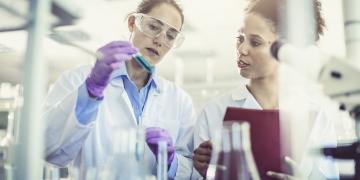The plastics industry represents approximately 6% of global fuel consumption, and this proportion is set to rise to 20% by 2050.The energy-intensive processes required at the stages of extraction, oil refining and plastic material production generate a colossal amount of greenhouse gas emissions. Given the effects of plastic waste on the climate and our ecosystems, it is crucial for the companies concerned to contribute to developing the circular economyThe circular economy is a restorative and regenerative economy. By maintaining the value of the products, materials and resources in the economy through smart product design, repurposing and/or shared use of products, it reduces the extraction of natural resources by using resources already present in the economy..
Challenges for the sector
The Belgian plastics industry is hard at work in the transition towards a circular economy. Although there is clear progress, a multitude of challenges remain. How can we maintain plastic materials in the economic cycle by maintaining their quality and value? It is essential to extend the lifespan of materials, by reusing them or recyclingAny recovery operation through which waste, including organic waste, is reprocessed to become substances, materials or products that can be used for their initial function or other functions. them at the end of their life cycle, but also by integrating more recycled raw materials into production processes.
Eco-design and cooperation
The transition towards a circular economy in the plastics industry requires:
- incorporating, from the product design stage, sustainability criteria such as repairRepair is making a faulty product work again, allowing its use to be extended without the user parting with it, or with a view to reuseReuse designates all operations by which substances, materials or products that are not waste are used again in an identical way to their originally intended purpose. (donation, second-hand sale).ability, re-use and re-employment. These approaches reduce the consumption of raw materials and limit waste flows. Beyond cost reduction, it also opens the door to new economic opportunities for businesses,
- investing more in smart eco-design,
- increasing the selective collection of plastic waste,
- investing in innovative and/or proven sorting and recycling techniques (such as physical or chemical recycling, as a complement to mechanical recycling),
- and promoting cooperation between companies and sectors throughout the value chain.
Moreover, the industry can also promote the sharing economy to maximise the use of plastic products such as packaging and containers. This transition still needs a lot of innovation and investment, but in time it offers the prospect of closing the plastics loop.
Find out more






